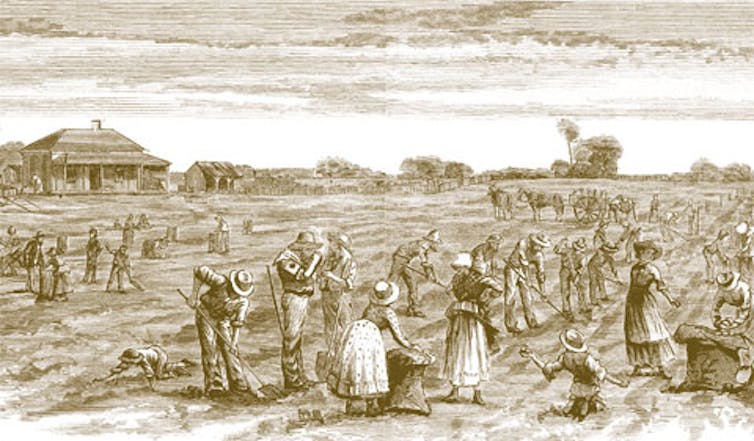
Australian English decidedly finds its origins in British English. But when it comes to chasing down Irish influence, there are – to paraphrase Donald Rumsfeld – some knowun knowuns, some unknowun knowuns, and a bucket load of furphies.
Larrikins, sheilas and Aboriginal Irish speakers
The first Irish settlers, around half of whom were reputedly Irish language speakers, were viewed with suspicion and derision. This is reflected in the early Australian English words used to describe those who came from Patland (a blend of Paddy and Land).
The Irish were guided by paddy’s lantern (the moon); their homes adorned with Irish curtains (cobwebs); and their hotheadedness saw them have a paddy or paddy out. These Irish were said to follow Rafferty’s Rules – an eponym from the surname Rafferty – which meant “no rules at all”.
More than a few Irish were larrikins. In his book Austral English, E.E. Morris reports that in 1869, an Irish sergeant Dalton charged a young prisoner with “a-larrr-akin about the streets” (an Irish pronunciation of larking, or “getting up to mischief”). When asked to repeat by the magistrate, Dalton said: “a larrikin, your Worchup”.
This Irish origin of larrikin had legs for many years, and perhaps still does. Unfortunately, here we have our first furphy, with more compelling evidence linking larrikin to a British dialect word meaning “mischievous or frolicsome youth”.
But if larrikin language is anything to go by, these youths went way beyond mischievous frolicking – jump someone’s liver out, put the boot in, stonker, rip into, go the knuckle on and weigh into are just some items from the larrikin’s lexicon of fighting words.
With the Dalton furphy, though, we see evidence of something called “epenthesis”, the insertion of extra sounds. Just as Dalton adds a vowel after his trilled “r” in a-larrr-akin, many Aussies add a vowel to words like “known” and “film” (knowun and filum) –...
Keep reading on Quick and Dirty Tips
Tidak ada komentar:
Posting Komentar